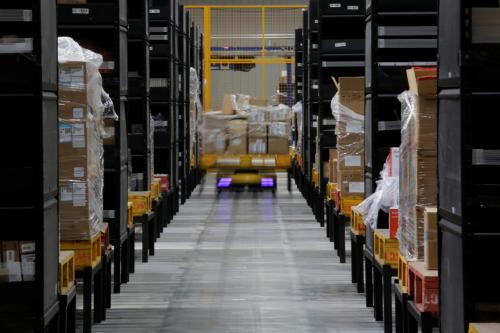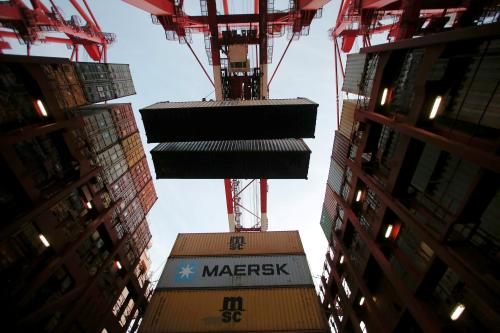While President Trump continues to dismantle existing world order, which was carefully constructed over seven decades following the horrors of World War II, too many of our elected leaders have stayed strangely silent on the administration’s trade war.
I understand there are no shortage of political crises to speak out on, and that—unlike the urgent humanitarian crisis at our southern borders—the fallout from the trade wars will happen in slow motion. But make no mistake: this administration’s trade policies are a train wreck in the making.
Across party lines, politicians who stay silent are complicit. They’re not only making a huge short-term political mistake—because American workers in their districts and states will suffer from a trade war—but will also be judged harshly by history for allowing the global order to unravel despite what we know about post-War history and the fundamentals of economics.
The bullets in Trump’s trade war include: a threat to rip up NAFTA; tariffs on steel and aluminum from everywhere else (at first, our now distanced allies were thought to be exempted); tariffs on $50 billion on Chinese imports with threats to go much higher; and even a reported threat to pull out of the World Trade Organization, which would require Congressional ratification.
These are radical ideas that have already triggered retaliation against our exports by the EU and China, with more restrictions sure to come if Trump follows through on his remaining tariff threats. Eventually, stock investors are going to realize that, in our highly interconnected economy, pulling on the threads of the global sweater can unravel the whole thing. A major stock market correction awaits, with fallout for both consumers and firms. Commerce Secretary Wilbur Ross is wrong to be so dismissive when saying the administration doesn’t care if that happens, because the President is trying to “fix a long-term problem that should have been fixed a long time ago.”
If Herbert Hoover were alive today, having recognized his huge mistake of pushing similar policies that stirred the trade war in the 1930s and then deepened what would become the Great Depression, he surely would tell the administration to stop this madness. Hoover, of course, pushed these policies just before he was soundly defeated by Franklin Roosevelt in 1932.
Democrats now have a unique opportunity to bond with pro-trade Republicans (and there are some left) to stop this. It’s not impossible to create a Senate majority for legislation that would curb the President’s ability to impose tariffs for national security reasons (under Section 232 of the Trade Expansion Act of 1962). If Senator McConnell stands in the way of building that majority, then at least the American people will know who’s on the right side of common sense as stocks and the U.S. and global economies begin to sink.
The trade war will demonstrate in a vivid way how the U.S. and global economies are highly interconnected. Tariffs may protect certain industries and jobs, but will penalize consumers of their products, and raise the costs of inputs of exporters trying to remain competitive in global markets. Farmers and manufacturers who depend heavily on foreign markets – in Europe, China, Canada and Mexico — already are justifiably worried. As the war intensifies, expect layoffs in exporting firms to match or exceed any job gains in import-sensitive sectors.
It is not an accident that the major U.S. auto companies have opposed the threatened auto tariffs, while the nation’s largest business organizations have urged the administration to halt the trade war before it gets worse.
Democrats who find themselves uncomfortable supporting the same cause as big business—and aligning themselves with pro-trade Republicans—should not be so hesitant. How many times, throughout the Mueller investigation, have we heard Democrats urging Republicans to put country over party? They and more Republicans need to look in the mirror and apply the same test on trade.
Opposing a trade war does not mean you are “weak on trade,” just as supporting diplomacy over bullets in other spheres of foreign policy mean that you are “weak on national security.” It means you have common sense, a grounding in history, and a desire to keep our economy from running off the rails.
If Democrats are looking for a way to challenge their pro-trade Republican colleagues into doing something positive for America’s workers, they should go all-in on a set of adjustment policies that help workers who want to help themselves. These policies would support the building of new skills in a labor market that will be constantly demanding them. They would strengthen the safety net for workers displaced for a range of reasons, not just trade, which should appeal to Democrats. Republicans should be attracted by programs that tie financial assistance to work and continued lifetime education. For examples, see an excellent 2018 report by a task force of the Council on Foreign Relations or my own recent essays on what to do about “automation anxiety.”
Meanwhile, President Trump’s obsession with “unfair trade practices” ignores two key facts. First, most tariffs and trade barriers have already been eliminated through U.S.-led coalitions with other willing parties. Second, the administration’s decision to pull the U.S. out of the Trans Pacific Partnership (TPP) gave away the best leverage we had for incentivizing China to moderate its worst practices, like requiring foreign companies to give up their technological secrets as a condition for doing business in China.
I do not expect the President or his closest trade advisers to suddenly embrace what economists across the political spectrum have been telling him and the American people for decades: you don’t measure “fairness” by our overall trade deficit, which reflects the shortfall between national saving and investment, or even by bilateral trade balances. The President has long believed otherwise, and as a proud Wharton graduate myself, I’m aghast that he apparently didn’t manage to learn or retain these economic basics that all undergraduates there (and in economics classes offered by universities across the country) have learned for decades.
No one wins trade wars, and as in wars, a lot of innocent people will get hurt, many of them badly. Let us hope and expect thoughtful political leaders from both political parties to quickly come together to halt the slide into economic warfare. History will judge them harshly if they do not.






Commentary
History won’t be kind to politicians who stay silent on Trump’s trade war
July 17, 2018